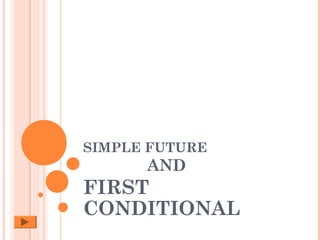
Simple Future and First Conditional
- 2. AFFIRMATIVE FORMAFFIRMATIVE FORM Sujeto +Sujeto + willwill + Verbo Infinitivo+ Verbo Infinitivo He will catch the bus. He’ll catch the bus.
- 3. NEGATIVE FORMNEGATIVE FORM Sujeto+Sujeto+ will+notwill+not+ Verbo Infinitivo+ Verbo Infinitivo They won’t be scared of the story.
- 4. TIME EXPRESSIONS andTIME EXPRESSIONS and USESUSES Tomorrow In 2020 Next … year summer month In … five minutes ten days 100 years
- 5. INTERROGATIVE FORM andINTERROGATIVE FORM and SHORT ANSWERSSHORT ANSWERS Will + Sujeto + Verbo Infinitivo ?Will + Sujeto + Verbo Infinitivo ? Yes, it will. No, it won’t.
- 6. FIRST CONDITIONALFIRST CONDITIONAL Es una oración compleja; es decir, hay una parteEs una oración compleja; es decir, hay una parte principal y otra subordinada. Cada una de ellas en inglésprincipal y otra subordinada. Cada una de ellas en inglés se llamase llama En inglés, por tanto va a haber dos verbos y dosEn inglés, por tanto va a haber dos verbos y dos sujetos.sujetos. LaLa subordinate clausesubordinate clause establece una condición para queestablece una condición para que se produzca la acción de la oración principal.se produzca la acción de la oración principal. El nexo condicional en inglés esEl nexo condicional en inglés es El orden de la oración principal y la subordinada esEl orden de la oración principal y la subordinada es indistinto.indistinto.